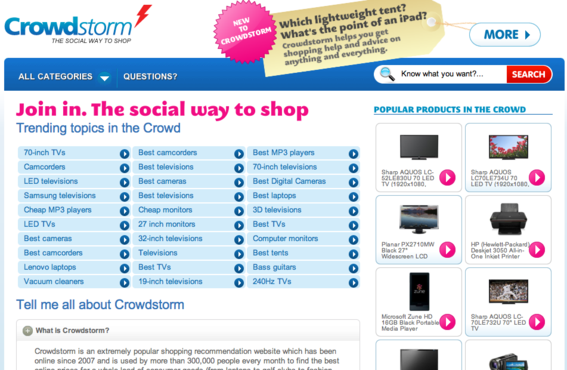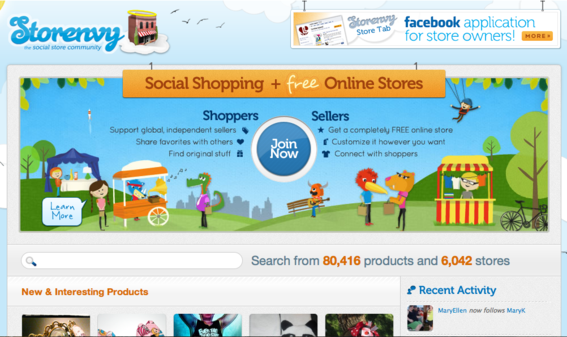Social shopping combines product sales with consumer recommendations in a social network environment. The concept centers around communities of people who share similar interests and who rely on the opinions of fellow members to influence purchase decisions.
Some sites are completely consumer-driven; they do not allow for merchant participation. Here is a list of 13 social shopping sites that do offer ways — some for free, others charge a fee — for merchants to submit products.
1. Crowdstorm.com

Crowdstorm partners with PriceGrabber.com to provide product listings.
Crowdstorm is a shopping recommendation website with two goals: (a) a hub for product reviews, and (b) a source where shoppers can find the best online prices for consumer goods such as electronics, sporting equipment, clothing and jewelry. The site is fueled by user-submitted product listings and product reviews. But it also has expert reviews, buyer guides, and question-and-answer sessions. The site promotes an open policy by allowing users to post their reviews to blogs, other reviews sites and online stores.
Crowdstorm partners with PriceGrabber.com to provide product listings. As such, merchants cannot submit products to the site directly, but to PriceGrabber instead using its merchant partner program, which is a cost-per-click (CPC) advertising channel. Prices range from $.25 to $1.15 per click.
2. CheapTweet.com
CheapTweet finds coupons, sales and discounts that people are talking about on Twitter. Each day its search engine identifies more than 20,000 new tweets about deals, then filters the results to what the site determines is the best of the lot.
Merchants can use the site in one of three ways:
- Advertising. Starting at as little as $6.00 for 1,000 ad impressions, merchants can advertise products via the CheapTweet sidebar or through sponsored tweets.
- Tweets listings. Merchants can tweet their own listings.
- CheapTweet Stores. These are designed for larger ecommerce merchants and, therefore, may be unaffordable for smaller budgets. Nevertheless, it is an option.
3. MyPerfectSale
MyPerfectSale is an online shopping destination dedicated to apparel and accessories. It features products from popular designer brands. Though the steps are not clearly spelled out, merchants that sell luxury merchandise can request to be featured on the website.
4. Wishpot.com

Wishpot enables users to create online lists and registries.
Wishpot lets consumers create wishlists and registries — such as birthday or Christmas wishlists; wedding or baby registries — then share that information with friends and family.
Wishpot provides the technology to enable shoppers to collect items from any online store or website and captures details including the product name, image, price and where to buy. Personal notes and tags can also be added. Consumers can also search for products and research prices, ratings and reviews.
Merchants cannot submit products directly to Wishpot, but work through Venpop — a partner company that provides social commerce technology — to syndicate products to a variety of social networks, including Facebook, Twitter and Wishpot.
5. Tribesmart.com
At Tribesmart, users can add products to the site, write reviews and share products with friends. Merchants can use the same techniques to build awareness of products as well. The site also allows merchants to upload product data feeds.
6. Polyvore.com
Polyvore is social shopping site dedicated to the fashion conscious. Users find products listed on the site, and then create “sets” — which are wardrobe products designed to show off a person’s style. Merchants can use the site for free by: (a) creating a profile, (b) adding products, and (c) creating sets.
Once a merchant creates a profile and uploads products, Polyvore encourages the merchant to engage with other members by commenting and liking his or her sets. The site believes that such activity will be reciprocated.
7. Listia.com

Listia uses credits instead of real money.
Listia is an online auction site where users bid on other people’s merchandise by using credits instead of real money. Essentially, it is a barter system where users can give away items they no longer need in exchange for items they do. New users get promotional credits so they can start bidding.
To benefit merchants, Listia also offers “Sponsored Auctions and Raffles,” which are run by companies or advertisers to promote a specific product by offering to give one away to Listia users. Sponsors can add information about the product, including detailed photos and also get a direct link back to their own websites or product pages in the auction. Listia suggests this is a way for merchants to draw attention to products they sell, drive traffic to the merchants’ sites and potentially increase their customer bases.
Participating merchants receive:
- Sponsored auction or raffle listing on Listia.com;
- Promotion of the listing via a rotating banner ad;
- Ability to promote products, the brand, website and business;
- Outbound link to the merchant’s website or specific product page;
- Chance to engage with customers via comments section.
Listia requires that the free item be valued at over $50, as a manufacturer’s suggested retail price. Currently, there are no fees to the merchant for creating the profile or product listing.
8. Shopow.com
Shopow is a U.K.-based shopping search engine and online shopping community. The site works via a “cost per sale” commission, wherein retailers pay Shopow a commission for any sales generated from a referral through its network. Retailers can list individual products or entire product catalogs for free. Shopow works with several advertising networks in the U.S. and the U.K. to promote the site.
9. Pinterest.com
Pinterest lets users organize and share items found on the web. What makes the site unique is that people create “pinterests” — which are virtual bulletin boards — to conduct activities such as plan weddings, decorate their homes, or organize favorite recipes. Registered users can browse each other’s bulletin boards. Merchants can add a “Pin It” button on product pages to encourage users to add products to their board.
Currently, access to the site is available by invitation only. A prospective user can request an invitation from the site itself or by being invited by someone who is already a member.
10. Storenvy

Merchants can create an online store free of charge using Storenvy.
According to its website, social marketplace Storenvy provides sellers with a “completely free and easy way to create fully customizable and feature-rich online stores, while allowing shoppers to interact with sellers and each other.”
Online merchants can create their own stores at no charge and with no programming knowledge. Storenvy combines all such stores into an online “mall,” which it refers to as a marketplace. Shoppers browse all the stores at once, and can save favorite items for later reference, and follow updates from their favorite stores and from other users.
11. Svpply.com
Svpply is an online shopping community that has over 550,000 products, all submitted by members. Merchants encourage the inclusion of their products into Svpply by including code on the merchant’s own product pages. The code creates a button that, when clicked, takes users to the Svpply website. Once a product is added to the database, a store page is created.
12. Mydeco
Mydeco is a site dedicated to home decor. As with other social shopping sites, users can share information and make recommendations about products. To date, the site lists more than 800 home retailers, including both large brands as well as smaller, niche boutique stores. The company welcomes new retail partners and encourages interested merchants to make contact via the website.
13. Buzzillions.com

Buzzillions has collected over 15 million customer reviews.
Buzzillions is a product review site owned by rating-and-review provider Power Reviews. Buzzillions says it helps shoppers “avoid costly mistakes.” It offers product reviews and tools for users to research purchases before they buy. To date, the site has collected over 15 million reviews across a range of categories, all from merchants that are part of the Power Reviews’ network.




